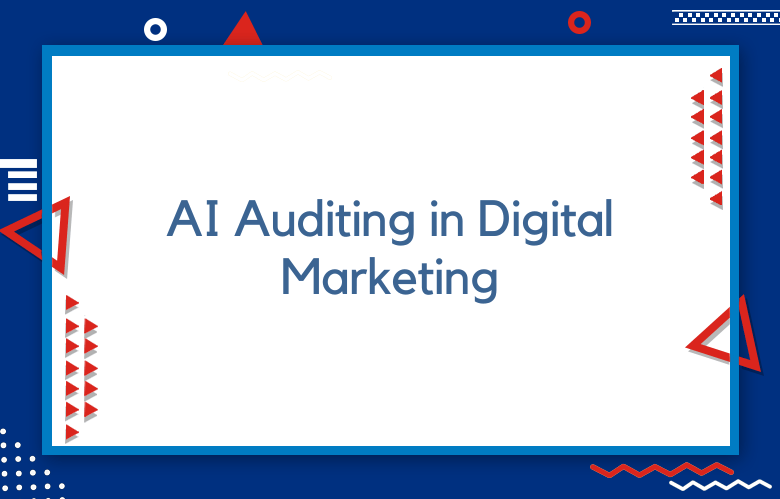AI Auditing & Governance Best Practices in Digital Marketing

AI auditing and governance in digital marketing are becoming increasingly important as organizations rely more on artificial intelligence to drive decision-making, personalize customer experiences, and optimize campaign performance. Effective management and regular audits ensure that AI systems operate transparently, ethically, and in compliance with regulations, maintaining customer trust and safeguarding brand reputation.
AI Auditing & Governance: Best Practices in Digital Marketing
AI auditing involves evaluating algorithms, data practices, and outcomes for fairness, accuracy, transparency, and ethical integrity. It helps identify potential biases, privacy issues, or ethical concerns in AI-driven marketing initiatives and ensures that AI systems align with organizational values and legal standards.
AI governance, on the other hand, encompasses the broader framework of policies, practices, and standards that guide the development, deployment, and ongoing management of AI technologies in digital marketing. This includes defining clear roles and responsibilities, establishing ethical guidelines for AI use, implementing data privacy and security measures, and setting up processes for continuous monitoring and improvement of AI systems.
Best practices in AI auditing and governance include involving diverse stakeholders in developing and reviewing AI systems, adopting explainable AI techniques to ensure transparency, regularly updating governance frameworks to adapt to new technologies and regulations, and fostering a culture of ethical AI use within the organization.
By implementing robust AI auditing and governance practices, digital marketers can harness the power of AI technologies responsibly and effectively, driving innovation and competitive advantage while upholding ethical standards and building trust with customers.
- Key Takeaways
- AI in Digital Marketing
- Importance of AI Governance
- Basics of AI Auditing
- Implementing AI Auditing Processes
- Structuring Effective AI Governance
- Marketing’s Role in AI Governance
- Data Privacy and Bias Mitigation
- Building Customer Trust with AI
- Monitoring AI Performance and Compliance
- Closing Thoughts
- Frequently Asked Questions
- What is the significance of AI governance in digital marketing?
- How can businesses benefit from implementing AI auditing processes?
- Why is monitoring AI performance and compliance crucial for digital marketing success?
- How do data privacy and bias mitigation play a role in AI governance for digital marketing?
- What role does marketing play in ensuring effective AI governance practices?
In digital marketing, ensuring AI auditing and governance is paramount for success. With the rapid evolution of artificial intelligence technologies, businesses must navigate the complexities of AI implementation while maintaining ethical standards and compliance. AI governance for digital marketing involves setting guidelines, monitoring algorithms, and mitigating risks to uphold transparency and accountability. By prioritizing AI auditing practices, organizations can build trust with consumers, enhance decision-making processes, and safeguard against potential pitfalls in their marketing strategies. Stay ahead of the dynamic digital marketing landscape by embracing robust AI governance frameworks tailored to your needs.
Key Takeaways
- Implementing AI auditing processes is crucial for ensuring the accuracy and reliability of AI systems in digital marketing.
- Structuring effective AI governance frameworks helps maintain transparency, accountability, and ethical use of AI in marketing strategies.
- Marketing teams play a vital role in collaborating with AI experts to ensure that AI technologies align with business goals and ethical standards.
- To build customer trust, prioritize data privacy, and mitigate biases in AI algorithms used for digital marketing campaigns.
- Monitor AI performance and compliance regularly to identify issues, optimize strategies, and uphold ethical standards in marketing practices.
- Actionable Insight: Incorporate AI auditing practices, establish robust AI governance structures, and prioritize data privacy to enhance the effectiveness and trustworthiness of AI-driven digital marketing initiatives.
AI in Digital Marketing
Revolutionizing Strategies
AI is transforming digital marketing by enhancing data analysis, predicting trends, and automating tasks for efficiency. With AI tools, marketers can optimize campaigns, improve targeting accuracy, and enhance overall customer experience.
AI algorithms can analyze vast amounts of data to identify patterns and predict future behaviors accurately. By leveraging machine learning algorithms, marketers can create more effective strategies based on real-time insights and trends.
Customer Segmentation
AI is crucial in customer segmentation. It divides audiences into specific groups based on behavior, preferences, and demographics. This enables marketers to deliver personalized content, offers, and recommendations tailored to each segment’s needs.
By utilizing AI-powered tools for customer segmentation, digital marketers can enhance their targeting precision, increase engagement rates, and drive conversions effectively. This leads to improved customer satisfaction and loyalty over time.
Optimizing Marketing Campaigns
AI is instrumental in optimizing marketing campaigns to achieve better ROI by automating processes like ad placement, content optimization, and budget allocation. Marketers can use AI to test multiple variables simultaneously and adjust real-time strategies for maximum impact.
With AI-driven optimization, marketers can continuously refine their campaigns based on performance data. This results in higher conversion rates, lower acquisition costs, and improved campaign effectiveness.
Importance of AI Governance
Mitigating Risks
AI governance is crucial in mitigating risks associated with AI usage in digital marketing. Organizations can ensure that AI systems operate ethically and responsibly by implementing clear guidelines and protocols. Without proper governance, there is a higher likelihood of biases, errors, and unintended consequences in decision-making processes.
Establishing a framework for assessing risks posed by AI-driven algorithms is essential. This involves identifying potential vulnerabilities, evaluating the impact of algorithmic decisions, and implementing measures to address any identified risks. Through proactive risk assessment, companies can enhance the reliability and trustworthiness of their AI applications.
Compliance with Regulations
Compliance with internal policies and external regulations is a crucial aspect of AI governance for digital marketing. Organizations must adhere to data protection laws, industry standards, and ethical guidelines when deploying AI technologies in marketing strategies. Failure to comply with these regulations can result in legal repercussions, financial penalties, and damage to brand reputation.
Key Points
- Implement clear guidelines for ethical AI usage.
- Proactive risk assessment enhances reliability.
- Compliance with regulations ensures legal adherence.
Ensuring Ethical Practices
Ethical considerations are at the core of effective AI governance. Companies can build trust with customers and stakeholders by establishing frameworks that prioritize fairness, transparency, and accountability in AI decision-making processes. Ethical practices safeguard against potential harm and contribute to long-term sustainability and success in digital marketing initiatives.
Basics of AI Auditing
Definition of AI Auditing
AI auditing involves evaluating and assessing artificial intelligence systems to ensure transparency and accountability. It plays a crucial role in verifying that AI technologies operate ethically and comply with regulations.
Critical Components of AI Auditing
Data Validation
We are verifying data training AI algorithms’ quality, accuracy, and relevance.
Algorithm Assessment
I am evaluating the performance, fairness, and potential biases embedded in AI models.
AI audits are essential to detect and rectify discrepancies or unethical practices within AI systems. Organizations can enhance trust in their AI applications by scrutinizing data sources and algorithmic decisions.
Conducting AI Audits
Organizations initiate AI audits by first defining the assessment’s scope and objectives. They then analyze the data pipelines, model training processes, and decision-making frameworks to pinpoint inconsistencies or biases.
During the audit process, experts examine the datasets for representativeness and bias while assessing the algorithm’s behavior across various scenarios. By identifying discrepancies early on, companies can mitigate risks associated with biased outcomes or erroneous predictions.
Implementing AI Auditing Processes
Steps
Implementing AI auditing processes in digital marketing involves several key steps. Firstly, organizations need to identify the scope of their AI systems and the data they process. Next, they must establish clear auditing objectives to ensure compliance with regulations and ethical standards. After setting objectives, companies should select appropriate auditing tools that align with their goals and technology stack. Finally, conducting regular audits and incorporating feedback loops are essential to continuously improving AI systems.
Challenges
Organizations may encounter various challenges when implementing AI auditing in digital marketing. One common issue is the complexity of AI algorithms, making it difficult to understand how decisions are made. Ensuring data privacy and security throughout the auditing process can be challenging due to the vast amount of customer data involved. Moreover, integrating auditing processes seamlessly into existing marketing workflows without disrupting operations poses a significant challenge for many organizations.
Examples
Several successful implementations of AI auditing in the marketing industry serve as excellent examples for organizations looking to adopt similar practices. For instance, a leading e-commerce company implemented AI auditing to monitor product recommendations, ensuring they were accurate and unbiased. Another example is a social media platform that utilized AI auditing to detect and mitigate algorithmic biases in content distribution, enhancing user experience and trust.
Structuring Effective AI Governance
Industry Suitability
Different industries require tailored structures for effective AI governance to meet their unique needs and challenges.
- Healthcare sectors benefit from governance models focusing on patient data privacy and ethical AI use.
- Financial institutions prioritize robust governance frameworks to ensure compliance with regulatory standards.
Role Clarity
Technical members and leaders play a pivotal role in directing the development and deployment of AI models within organizations.
- Data scientists are responsible for designing and training AI algorithms, ensuring accuracy and performance.
- C-suite executives provide strategic oversight, aligning AI initiatives with business objectives.
Transparency and Explicability
Ensuring transparency and explicability in governed AI/ML modeling is crucial for building trust and mitigating risks.
- Transparent AI systems allow stakeholders to understand how decisions are made, fostering accountability.
- Explicability enables auditors to assess the fairness and potential biases embedded in AI algorithms.
Marketing’s Role in AI Governance
Customer Advocacy
Marketing plays a crucial role in advocating for customers within AI governance. By understanding customer needs and preferences, marketers can ensure that AI systems are developed and deployed in ways that prioritize customer satisfaction. This involvement helps to build trust and loyalty among consumers.
Brand Protection
Protecting the brand is a significant aspect of marketing’s contribution to AI governance. Marketers work closely with AI teams to ensure the algorithms and models align with the brand values and messaging. This collaboration helps in maintaining a consistent brand image across all AI-driven interactions.
Decision-Making Support
Marketing involvement in decision-making processes related to AI model deployment is essential. Marketers provide valuable insights into customer behavior, market trends, and competitive landscape, which can influence how AI technologies are utilized to enhance customer experiences effectively.
Privacy Assurance
Marketers also play a vital role in ensuring customer privacy within AI systems. By advocating for transparent data collection practices and robust privacy policies, marketers help mitigate potential risks associated with data breaches or misuse. This proactive approach safeguards both customer trust and regulatory compliance.
Bias Mitigation
Another critical responsibility of marketing in AI governance is mitigating bias in AI models. Marketers collaborate with data scientists and AI engineers to identify and address biases that may inadvertently impact customer segments. This proactive stance promotes fairness and inclusivity in AI-powered marketing initiatives.
Data Privacy and Bias Mitigation
Safeguarding Customer Information
Data privacy is crucial in AI applications to protect sensitive customer data from unauthorized access. Implementing robust security measures such as encryption and access controls can prevent data breaches.
Customer trust is paramount in digital marketing, and ensuring the confidentiality of their information fosters loyalty and positive brand perception. By prioritizing data privacy, businesses can build long-lasting relationships with their customers.
Ethical AI Practices
Mitigating bias in AI models is essential to ensure fair and unbiased decision-making processes. Regular audits of algorithms can help identify and rectify any biases in the system, promoting transparency and accountability.
Implementing diverse datasets during model training can reduce bias by providing a more comprehensive representation of the target population. Organizations can uphold integrity and fairness in their operations by incorporating ethical guidelines into AI development.
Impact on Customer Trust
Data privacy breaches compromise customer information and erode trust in the brand. Customers are increasingly concerned about the security of their data, and any lapses can lead to severe repercussions for the company’s reputation.
Biased AI models can result in discriminatory outcomes, alienating specific customer segments and tarnishing the brand’s image. Organizations can strengthen customer trust and loyalty by prioritizing fairness and transparency in AI governance.
Building Customer Trust with AI
Transparent Practices
Implementing transparent AI practices can build customer trust. Companies can enhance transparency by openly sharing how AI algorithms work and the data they use.
AI models should be regularly audited to ensure they are free from biases and errors that could impact customers. This fosters trust in the technology.
Marketing Communication
Marketing plays a crucial role in communicating AI’s benefits and implications to customers. Clear and concise messaging helps customers understand how AI enhances their experience.
Companies should emphasize ethical practices in their marketing strategies, showcasing how AI is used responsibly to benefit customers without compromising privacy.
Successful Examples
- Google’s use of AI in search algorithms demonstrates how transparency and accountability can build trust.
- Amazon’s personalized recommendations showcase the benefits of AI while respecting customer preferences.
- Netflix’s recommendation system highlights how ethical AI practices can enhance user experience.
Monitoring AI Performance and Compliance
Importance
Monitoring AI performance is crucial to guarantee its effectiveness and accuracy in digital marketing strategies. It ensures that the AI systems operate optimally and deliver the intended outcomes.
Regular AI performance monitoring allows businesses to promptly identify deviations or issues, enabling timely interventions to maintain smooth operations.
Role
Compliance is vital in upholding ethical standards and meeting regulatory requirements within AI governance for digital marketing. It ensures that AI technologies adhere to legal guidelines and industry best practices.
Enforcing compliance measures can help companies build trust with their customers by demonstrating a commitment to transparency and responsible use of AI in marketing campaigns.
Tools and Techniques
Various tools and techniques are available for monitoring AI performance and ensuring compliance in digital marketing endeavors. These include:
Performance Metrics
We are utilizing key performance indicators (KPIs) to track the efficiency and accuracy of AI algorithms.
Auditing Software
It implements specialized software solutions that analyze AI processes for anomalies or biases.
Ethical Frameworks
We are incorporating ethical frameworks like fairness, accountability, and transparency (FAT) principles into AI development and deployment.
Regulatory Guidelines
I adhere to data protection laws such as GDPR to safeguard consumer privacy when using AI in marketing strategies.
Incorporating these tools and techniques enables businesses to maintain high standards of AI governance while effectively leveraging artificial intelligence’s power in digital marketing.
Closing Thoughts
You’ve delved into the realm of AI auditing and governance, understanding their pivotal roles in shaping ethical and effective digital marketing strategies. By grasping the importance of monitoring AI performance, mitigating biases, and fostering customer trust, you confidently equip yourself to navigate the complex landscape of AI-driven marketing. Structuring robust AI governance processes ensures compliance and transparency, safeguarding your brand reputation and consumer relationships. Embracing these practices elevates your marketing endeavors and sets a standard for responsible AI utilization in the industry.
Incorporate the insights gained here into your digital marketing operations to fortify your approach with ethical AI practices. Stay vigilant in auditing AI processes, upholding data privacy, and championing unbiased algorithms. By integrating these principles, you will enhance your marketing outcomes and contribute to a more trustworthy and sustainable digital ecosystem.
Frequently Asked Questions
What is the significance of AI governance in digital marketing?
AI governance in digital marketing ensures AI technologies’ ethical and compliant use. It helps maintain transparency, accountability, and fairness in decision-making, enhancing customer trust and loyalty.
How can businesses benefit from implementing AI auditing processes?
Implementing AI auditing processes allows businesses to identify their AI systems’ biases, errors, or inefficiencies. This helps improve the AI applications’ accuracy, reliability, and performance while ensuring compliance with regulations.
Why is monitoring AI performance and compliance crucial for digital marketing success?
Monitoring AI performance and compliance enables businesses to track the effectiveness of their AI strategies, ensure alignment with organizational goals, and detect deviations or risks. This proactive approach enhances decision-making and boosts overall marketing performance.
How do data privacy and bias mitigation play a role in AI governance for digital marketing?
Data privacy and bias mitigation are essential components of AI governance. They help protect consumer information, prevent discrimination, and uphold ethical standards. By prioritizing these aspects, businesses can build customer trust and foster long-term relationships.
What role does marketing play in ensuring effective AI governance practices?
Marketing teams play a vital role in advocating for ethical AI practices, aligning AI initiatives with customer expectations, and communicating transparently about data usage. Their insights help shape responsible AI strategies that enhance brand reputation and customer satisfaction.



